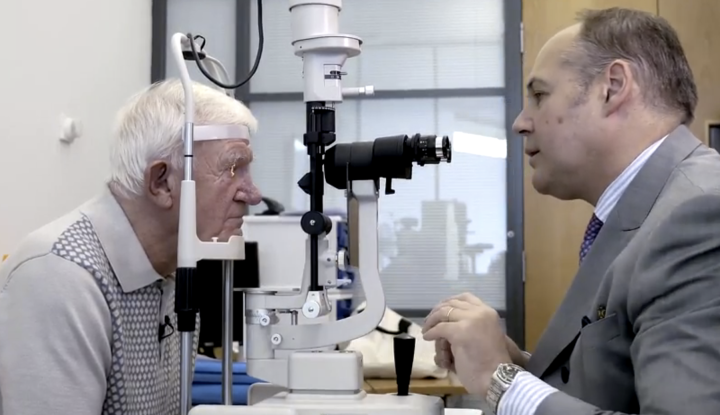
But now, two weeks after last month’s surgery, Flynn is demonstrating that the replacement of his own retina by a retinal prosthesis called Argus II was a success. In clinical trials conducted this week, he was able to determine whether a series of black and white bars on a computer screen were “patterned vertically, horizontally, and diagonally,” something that would have been impossible to do with AMD.
While previous clinical trials had proven Argus II’s effectiveness, Flynn’s case is the first to show that a human subject has been successfully cured of the degenerative disease. As Dr. Paulo Stanga, the lead surgeon on Flynn’s case, told the BBC, “Mr. Flynn’s progress is truly remarkable, he is seeing the outline of people and objects very effectively. I think this could be the beginning of a new era for patients with sight loss.”
The Argus II works by processing visual data that is collected from a tiny camera on glasses a patient wears, that is later converted into electrical pulses and sent wirelessly to electrodes found in the retinal prosthetic. This electric signal then stimulates cells that ultimately send information to the brain about what the patient is “seeing.”
The coolest thing about the implant is that it allows the wearer to “see” with his or her eyes closed — in conducting the experiment with Flynn, doctors ensured that he never opened his eyes so they could guarantee that the visual information he was processing was via the camera on his glasses and the implant, and not his natural eyes. Said Flynn, “It was wonderful to be able to see the bars on the screen with my eyes closed.” While this is by no means a way to restore 20/20 vision, Argus II is allowing patients to reclaim a level of sight that many had previously feared permanently lost.
At the end of the day, says Cathy Yelf, a member of the Macular Society, “This is an exciting result and we are following the progress of these trials with great interest. Macular degeneration can be a devastating condition and very many people are now affected as we live longer. These are early trials but in time this research may lead to a really useful device for people who lose their central vision.”


